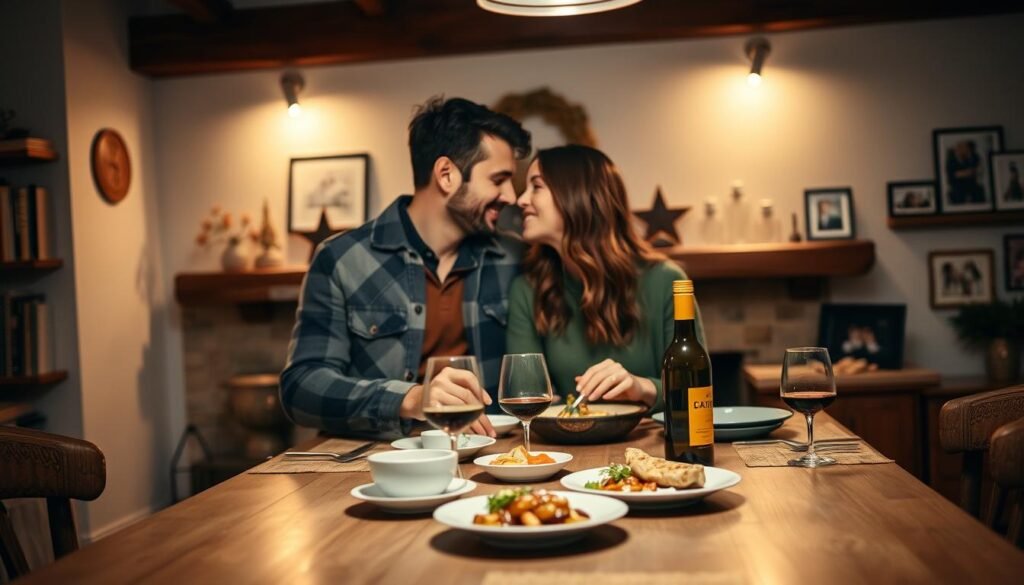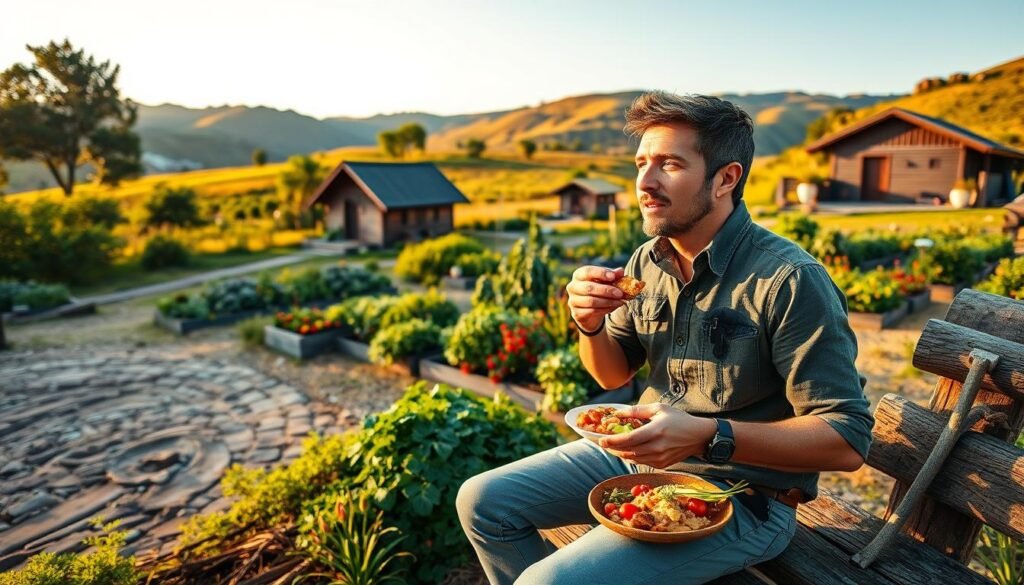Ever wondered why trying local foods or following your passions on vacation feels so good? When you travel, you’re not just tasting new flavors or doing hobbies. You’re really connecting with cultures and yourself.
This connection comes from the growing trend of culinary and passion travel. It’s about wanting experiences that truly touch your heart and soul. It’s about using mental health tourism to find fulfillment.
Key Takeaways
- Culinary and passion travel offer a deeper connection to cultures and oneself.
- These experiences are driven by a desire for meaningful, personal fulfillment.
- Mental health tourism plays a significant role in the appeal of such travel.
- Travel choices are increasingly influenced by psychological factors.
- Engaging in local cultures and passions can enhance your travel experience.
Understanding Travel Psychology and Its Influence
When you plan a trip, many emotions and thoughts come into play. Travel psychology looks into these feelings and thoughts. It helps us understand why we make certain travel choices.
Defining Travel Psychology
Travel psychology is a part of psychology that studies our minds and feelings when we travel. It looks at why we travel, how we act while traveling, and how we connect with places.
According to
« Travel is more than the seeing of sights; it is a change that goes on, deep and permanent, in the ideas of living. »
This change comes from the way travel affects us mentally.
Key Psychological Factors in Travel Choices
Several key factors shape your travel decisions. These include:
- Personal interests: Your hobbies and interests often dictate the type of travel experiences you seek.
- Emotional needs: Travel can be a means to satisfy emotional needs such as relaxation, adventure, or cultural immersion.
- Social influences: Recommendations from friends, family, or social media can significantly impact your travel choices.
The Role of Emotions in Travel Decision-Making
Emotions are crucial in deciding where to travel. The excitement of planning a trip, the experiences during it, and the memories after are all emotional. Knowing how emotions affect travel can help us choose more rewarding experiences.
For example, the love for culinary travel often comes from emotional ties to food and culture. Trying local foods can bring joy, nostalgia, or curiosity. This makes the trip more memorable.
The Rise of Culinary Travel: A Psychological Perspective
Culinary travel shows a deep desire to connect with a place through its food. As you travel, you’re not just looking for new sights. You’re seeking experiences that feed your body and soul.
Why Food Experiences Are So Appealing
Food experiences are key in travel because they engage your senses and create lasting memories. When you enjoy local cuisine, you’re not just eating. You’re joining a cultural tradition that connects you to the people and place.
Key aspects that make food experiences appealing include:
- The sensory pleasure of tasting new flavors and textures
- The opportunity to engage with local cultures through cooking classes or food tours
- The emotional connection formed by sharing meals with locals or fellow travelers
Culinary travel also boosts your emotional well-being on the road. By diving into local food traditions, you feel a sense of belonging and connection. This makes your travel experience richer.
Culinary Travel and Cultural Appreciation
Culinary travel opens doors to understanding and appreciating different cultures. Exploring local cuisines gives you insight into a culture’s history, values, and practices. It deepens your appreciation for its traditions.
Some popular psychology destinations known for their culinary experiences include:
- Italy, renowned for its rich culinary heritage and regional specialties
- Japan, celebrated for its unique and nuanced food culture
- Mexico, offering a vibrant blend of indigenous and Spanish culinary influences
By engaging with local food cultures, you not only enrich your travel experience. You also help preserve culinary traditions. This creates a meaningful and lasting impact.
Exploring Passion Travel: What Drives the Trend?
Travel has changed for many. It’s now about following your passions in new and exciting places. This trend shows a desire for meaningful experiences that mix personal interests with exploration.

The Connection Between Hobbies and Travel
Traveling with your hobbies can make your trip much better. Whether it’s painting, hiking, or photography, mixing hobbies with travel enriches your journey. It lets you dive deeper into local culture and makes your trip more rewarding.
Engaging in hobbies while traveling also helps you meet others. For example, joining a photography workshop or a cooking class can connect you with people who share your passions.
Identifying Personal Interests and Their Influence
Knowing what you love is crucial for a great trip. By identifying your passions, you can plan a trip that truly speaks to you. This way, your travels become about making memories and maybe even finding new passions.
Think about how your interests shape your travel choices. If you love hiking, look for places with amazing trails. If you’re into food, consider culinary tours and cooking classes. Matching your travel plans with your interests can make your trips more fulfilling and help you grow.
The Impact of Social Media on Travel Preferences
As you explore the world, social media shapes your travel choices. Sites like Instagram and Facebook are key in finding, planning, and sharing your trips.
Social media’s effect on travel is wide-ranging. It not only inspires your next trip but also lets you share your adventures. This sharing boosts your travel memories and connects you with other travelers.
Sharing Culinary Experiences on Platforms
For food lovers, social media is a treasure trove of tasty images and stories. You might spend hours on Instagram, finding new places to eat. This can change your travel plans, as you seek out places that offer more than just food.
Key aspects of sharing culinary experiences include:
- Showcasing local cuisine and hidden gems
- Sharing restaurant reviews and recommendations
- Highlighting food festivals and culinary events
Community and Connection: The Social Aspect
Social media also builds a community among travelers. You can meet others who love food and travel, swapping advice. This makes your trips more fun, as you feel part of a bigger group.
Some benefits of this community include:
- Access to insider knowledge and local tips
- Opportunities to join travel groups and meet like-minded individuals
- A platform to share your travel stories and inspire others
By using social media, you’re not just looking at pictures. You’re joining a global conversation about travel and culture. This makes your trips more memorable and meaningful.
The Healing Power of Travel
In today’s fast-paced world, taking a break to travel can be a powerful tool for maintaining your mental health and overall well-being. As you explore new destinations, you’re not just seeing new sights; you’re also giving your mind a much-needed respite from the daily grind.
Reducing Stress through Travel
Traveling allows you to step away from the stresses of daily life and immerse yourself in new experiences. Whether it’s a relaxing beach vacation or an action-packed adventure, travel provides a healthy distraction and an opportunity to recharge. Engaging in mental health tourism can be particularly beneficial, as it combines the therapeutic aspects of travel with intentional mental health practices.
Some of the ways travel can help reduce stress include:
- Providing a change of scenery, which can help shift your focus away from daily worries.
- Offering opportunities to engage in relaxing activities, such as yoga or meditation, in serene environments.
- Allowing you to disconnect from the routine of daily life and reconnect with yourself and your surroundings.

The Psychosocial Benefits of Culinary Experiences
Culinary experiences are a significant aspect of travel that can enhance your psychosocial well-being. By engaging with local cuisines, you’re not only exploring new flavors but also connecting with the culture and community of your destination.
| Benefit | Description |
|---|---|
| Cultural Connection | Experiencing local food traditions helps you understand and appreciate the culture of your destination. |
| Social Interaction | Dining with locals or fellow travelers can foster new connections and a sense of community. |
| Personal Growth | Trying new foods and cooking techniques can be a confidence-building experience. |
By incorporating culinary experiences into your travel plans, you can enrich your journey and enhance the therapeutic benefits of your trip. This holistic approach to travel, focusing on both the destination and the experiences within it, can lead to a more fulfilling and rejuvenating travel experience.
Crafting Distinct Travel Experiences
Travel experiences that stand out are often those that are carefully crafted to meet your individual desires. Whether you’re an avid foodie or an adventure seeker, the key to a memorable trip lies in understanding what makes your travel experiences unique.
Crafting distinct travel experiences involves more than just choosing a destination; it’s about curating activities, cultural immersions, and personal interactions that resonate with you. This curation process is deeply influenced by psychology travel trends, which highlight the importance of personalization and emotional connection in travel decisions.
Adventure Travel vs. Culinary Travel
Two popular travel trends are adventure travel and culinary travel. While both offer unique experiences, they cater to different aspects of your travel psyche.
- Adventure travel focuses on activities like hiking, skydiving, or exploring new terrains, appealing to your sense of excitement and thrill.
- Culinary travel, on the other hand, is about immersing yourself in local cuisines, cooking classes, and food festivals, satisfying your taste buds and curiosity about cultural traditions.
Both types of travel can be incredibly rewarding, and many travelers find that they enjoy a mix of both. The choice often depends on your current mood, interests, and what you’re looking to get out of your travel experience.
| Travel Type | Key Experiences | Psychological Appeal |
|---|---|---|
| Adventure Travel | Hiking, skydiving, exploring new terrains | Excitement, thrill, sense of achievement |
| Culinary Travel | Cooking classes, food festivals, local cuisine | Cultural immersion, sensory delight, personal connection |
The Importance of Unique Experiences
Unique travel experiences are crucial because they create lasting memories and a deeper connection to the places you visit. As Anthony Bourdain once said, « Your body is not a temple, it’s an amusement park. Enjoy the ride. » This quote encapsulates the essence of seeking out new and exciting experiences when traveling.
« The world is a book, and those who do not travel read only one page. » –
Unique experiences also foster personal growth and self-discovery. By stepping out of your comfort zone and engaging with different cultures and activities, you challenge yourself and develop new perspectives.
In conclusion, crafting distinct travel experiences is about understanding your preferences and desires, and then curating a trip that meets those needs. Whether through adventure, culinary exploration, or a mix of both, the goal is to create memories that last a lifetime.
The Role of Food in Creating Meaningful Memories
Trying local dishes can make you feel a strong connection to places. Food is more than just something to eat when you travel. It opens doors to understanding a place’s culture, history, and people. The memories you make through food can be very vivid and long-lasting.
Food can bring back strong emotions and memories of your travels. The smell of a dish, the taste of local ingredients, or seeing traditional cooking can instantly take you back. This emotional link is tied to how we remember and feel about events.
Culinary Traditions and Their Emotional Resonance
Culinary traditions are closely linked to a place’s culture and history. When you join in local food customs, you’re not just eating. You’re connecting with the community and its heritage. This can make you feel like you belong, even in a new place.
Some key things that make culinary traditions emotionally powerful include:
- Using local and seasonal ingredients, which ties the food to the land and the season.
- Traditional cooking methods, which are often passed down through generations.
- The communal aspect of dining, where meals bring people together and strengthen bonds.

Food as a Journey: Personal Stories
For many, the food experiences are the best part of their travels. The stories of food—how it’s made, where it comes from, and who it’s shared with—are key parts of their travel stories. These stories are about more than just the food; they’re about the people and places you meet.
Here are some personal stories that show how food impacts travel:
- Learning to make a traditional dish from a local chef, which teaches you about the dish’s cultural importance.
- Going to a local food festival, where the sights, sounds, and tastes create a memorable experience.
- Eating at a family-run restaurant, where the hosts’ warmth and the food’s authenticity leave a lasting impression.
These stories show how food can create lasting memories on your travels. By exploring local culinary traditions and connecting with the people who make the food, you can make your travels more meaningful. This can help you feel a deeper connection to the places you visit.
The Intersection of Travel and Personal Growth
Traveling is more than seeing new places. It’s a chance to grow personally. It challenges your views, broadens your understanding, and helps you know yourself better.
Learning Through Culinary Exploration
Exploring food is a big part of traveling. It’s not just about tasting local dishes. It’s diving into a place’s culture and traditions.
Joining a cooking class is a great way to learn. You get to see how local ingredients and cooking methods are used. It’s about understanding the story behind each dish.
- Discovering local ingredients and their significance
- Understanding the role of food in cultural and social gatherings
- Learning traditional cooking methods and recipes
Culinary exploration makes your travels richer. You learn new skills and appreciate the culture of places you visit.

Self-Discovery Through Passion Projects
Traveling with passion projects can be transformative. Activities like photography or writing help you discover yourself. They let you dive into what you love.
Keeping a travel journal is a great way to reflect. It helps you understand your feelings and experiences. It’s a way to document your journey and learn from it.
| Passion Project | Benefits |
|---|---|
| Photography | Enhances observation skills, fosters creativity |
| Writing | Promotes reflection, improves communication skills |
| Cooking | Develops new culinary skills, encourages cultural immersion |
By following your passions on the road, you grow personally. You learn more about yourself and the world.
Travel is a journey of self-discovery. It’s not just about seeing new places. It’s about growing and making lasting memories through local experiences and passion projects.
The Importance of Authenticity in Travel
Authenticity is key to a fulfilling travel experience. It lets you truly connect with a place. You’re not just visiting; you’re diving into the local culture and traditions.
Exploring new places, you seek real experiences. You’re drawn to popular psychology destinations that show you the true local life. You want to be part of the community, learn its values, and join in its customs.
Why Genuine Experiences Matter
Genuine experiences give you a deeper understanding of a place. When you take part in authentic activities, you’re more than a tourist. You’re a part of the local culture. This can mean trying local food, attending festivals, or just talking with the locals.
From a behavioral science in travel view, seeking authenticity meets our need for meaningful connections. You’ll remember and be touched by experiences that feel real and true to the local culture.
Seeking Local Flavors: A Psychological Drive
Trying local foods is a big part of authentic travel. Food brings people and cultures together. When you eat local cuisine, you’re not just eating; you’re experiencing the community’s history, traditions, and values.
The desire for local flavors comes from wanting something new and real. You’re attracted to unique dining spots that offer a taste of the local culture. These experiences not only please your taste buds but also connect you to the place and its people.
By looking for authentic experiences, like local foods, you make your travels richer. You also help keep local cultures and traditions alive. This way of traveling deepens your appreciation and understanding of the places you visit.
Future Trends in Psychology and Travel
Looking ahead, the psychology of culinary and passion travel will grow. New trends will come from changing values, tech, and understanding people better.
Emerging Culinary Experiences
Culinary travel will become more immersive and green. Expect more local food and cooking classes that show off old ways of cooking.
Evolving Passion Travel
Passion travel will focus more on personal growth and unique adventures. You’ll find more trips for hobbies and cultural dives.
By keeping up with these trends, you can get ready for travel that will really enrich your life.
FAQ
What drives the trend of culinary and passion travel?
People want to experience things that touch their heart and soul. They seek to connect with cultures and themselves on a deeper level. This is influenced by the need for emotional well-being and personal growth.
How does travel psychology influence your travel choices?
Travel psychology looks into why we make certain travel choices. It helps us pick experiences that fulfill us, whether it’s relaxation, cultural immersion, or adventure.
Why are food experiences so appealing in culinary travel?
Food experiences engage our senses and create lasting memories. They help us appreciate and understand cultures better. This is driven by our need for connection and exploration.
How does social media impact your travel preferences?
Social media platforms like Instagram and Facebook inspire and connect us. They make our experiences more enjoyable and memorable. They also spark a global conversation about travel and culture.
What are the psychosocial benefits of culinary experiences?
Culinary experiences offer a break from daily worries. They contribute to our emotional and psychological well-being. They also have a therapeutic effect, enhancing our travel experience and promoting mental wellness.
How can you craft distinct travel experiences?
To create unique travel experiences, understand what makes a trip special for you. Focus on activities, destinations, or cultural immersions that stand out. This way, you can craft journeys that are memorable and fulfilling.
What role does food play in creating meaningful memories?
Food connects us to a place’s culture and history. It offers a tangible link to the people and their way of life. It evokes emotions and nostalgia long after your trip, making it a key part of travel psychology.
How does travel contribute to personal growth?
Travel sparks learning and self-discovery. It challenges us and helps us grow as individuals. Through culinary exploration and passion projects, we gain new insights and experience significant personal growth.
Why is authenticity important in travel experiences?
Authenticity lets us connect with local cultures and people deeply. It enriches our travels and helps preserve local cultures and traditions. It’s a crucial element in travel psychology.
What can be expected from future trends in psychology and travel?
Future trends will be shaped by changing values, technology, and our understanding of human behavior. They will offer opportunities for personal growth and exploration. These trends will influence the future of culinary and passion travel.





